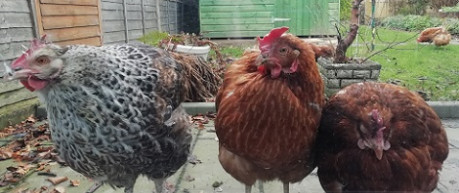Thursday 5th March 2020, 2:00pm
Leaky vaccines can help prevent transmission of Marek’s disease, chicken study finds.

Vaccines that typically manage disease symptoms but fail to prevent infection and spread are more effective than was thought in controlling the severity of a viral disease in chickens.
So-called leaky vaccines reduce the likelihood of chickens developing the painful symptoms of Marek’s disease, a study showed.
This benefit extends to unvaccinated chickens in the same flock as vaccinated birds, researchers found. Their findings offer valuable insight into Marek’s disease virus, which can lead chickens to develop tumours in various parts of the body, eye cancer, and wing and leg paralysis, eventually leading to death.
Marek’s disease has implications for animal welfare and the food production industry, as it can lead to a reduction in egg laying and meat being deemed unfit for human consumption. The virus spreads through inhalation of a mix of bird feed, bedding material, bird droppings, feathers and dead skin, and is estimated to cost the poultry industry US$1 billion a year.
Researchers at the Roslin Institute, in collaboration with researchers from the US Department of Agriculture’s Avian Disease and Oncology Laboratory (ADOL), tested the impact of vaccination on Marek’s disease transmission.
One group of chickens received a leaky vaccine – this contained a related live virus originating from turkeys, which causes an immune response but no symptoms. A second group received a sham vaccine, which contained no biological material.
Both groups of birds were then infected with Marek’s disease virus. Groups of these infected birds were placed with sets of unvaccinated chickens and more than 97 per cent of birds became infected.
However, unvaccinated chickens that had contact with vaccinated birds were less likely to develop full-blown Marek’s disease and there were fewer deaths. This was found to be because vaccinated birds transmitted fewer copies of Marek’s disease virus.
"In our study, we found that leaky vaccines can provide benefit in terms of reducing the presence and severity of symptoms, and mortality, caused by Marek’s disease even for unvaccinated chickens. We need further research to understand how this effect changes as the virus mutates and in other strains of chickens."
Dr Richard Bailey, Lead scientist and Research Fellow at the Roslin Institute"Our findings suggest that even leaky vaccines can play a key role in reducing disease transmission. However, this is only one component in tackling disease in farmed animals, others include improved animal husbandry and breeding for disease resistance."
Professor Andrea Doeschl-Wilson, Personal Chair in Animal Disease Genetics and Modelling at the Roslin Institute